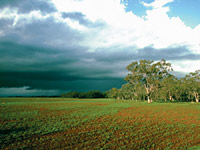|
||||||||||||||
| Environmental Studies | ||||||||||||||

Environmental Studies is concerned with the historical, theoretical, and policy implications of the human construction and transformation of the environment. There is a focus on contemporary environmental concerns, including how and why these concerns have risen to the forefront of current policy agendas, how social, economic and technological systems mediate our interaction with the environment, how these systems vary across the world and evolve with time and the ways in which environmental decisions are made and controversies resolved.
Today's society is faced with a vast number of environmental dilemmas - such as air pollution, depletion of the ozone layer, the serious risks to river health that come from intense human use of water resources, the large amounts of waste that industrial society creates, and threats to local and global biodiversity. A program of study in Environmental Studies at UNSW takes an interdisciplinary focus, offering geographical, legal, economic, ethical, historical and political perspectives for understanding the environment. Environmental Studies opens up diverse career opportunities, from research and journalism to policy-making in government agencies to industry management or community consultancy and dispute resolution. It also helps to develop valuable generic skills that will be useful in any professional setting. Studying Environmental Studies at UNSW At the present time, teaching and research in Environmental Studies is spread between a number of Schools in the Faculty of Arts and the Facuty of Science. Environmental Studies is offered by the School of History and Philosophy (http://hist-phil.arts.unsw.edu.au/) in the Faculty of Arts and Social Science. The School of Biological, Earth and Environmental Sciences (www.bees.unsw.edu.au) provides a focus for environmental teaching and is the principal contributor at the undergraduate level and a major contributor to postgraduate programs. The Institute of Environmental Studies http://www.ies.unsw.edu.au/ has responsibility for the successful Master in Environmental Management program. Please refer to the tables below which outlines the options available for a specialisation in Environmental Studies. Other related programs/plans can also be found under following other specialisations: Biological Science Chemistry Climate Science Geography Marine Science Oceanography Microbiology Immunology
Earth Science can be studied in the following Programs
Environmental Studies can be studied in the following Programs |
||||||||||||||



